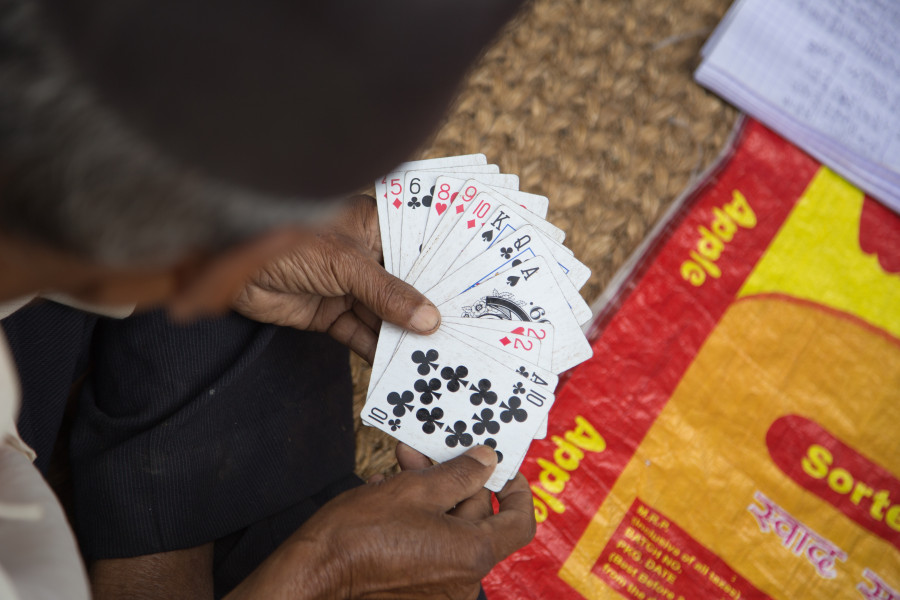Columns
Don't bet on it
In Nepal, the laws related to gambling are primitive and do not take into account nuances.
Akshya Aryal
On October 26 while the city of Kathmandu was rejoicing in the Tihar festival, the Nepal Police swooped on a private house at Maharajgunj which was being used as a gambling den. The police seized Rs26.7 million in cash and arrested 25 people. Gambling has been a part of festive activities from time immemorial in Hindu culture. Traditionally speaking, Deepawali marks the beginning of the Hindu fiscal calendar, and as a result, it continues to play an important role in society even today. In 2018-19, the police detained 2,869 individuals for gambling-related offences, the highest number recorded in the recent past. But these arrests have had no deterrent effect.
The Gambling Act 1963 defines gambling as 'any game of chance which is played upon laying a wager for gaining or losing money'. It mandated a maximum penalty of Rs200 for first-time offenders, and imprisonment ranging from one to three months for repeat offenders. Subsequently, with the passing of the Criminal Code 2017, the previous act was subsumed into it as section 125. Gambling has since been defined in a more exhaustive manner as 'any wager based on luck on the basis of which any property, movable or immovable, can be gained or lost, or resulting in other monetary profits or losses. Further, any wager on the win/loss of other persons would also constitute gambling.' The code increased the maximum penalty to three months' jail or a Rs30,000 fine for first-time offenders.
As an exception to the aforementioned provision, the law says that no activity shall constitute gambling that is practiced during a public festival, fairs (melas), auspicious days, or any function for entertainment purposes, insofar as the stakes are low and prior approval is taken from the government.
This provision seems to be quite challenging to understand for several reasons. For starters, given the vague wording of the provision, most games of chance may fall under the exception as either a festive game or a game for entertainment with small stakes. Not only does this render the provision futile, but it also vests absolute discretionary power in law enforcement agencies. Additionally, even though the exception requires that prior approval be obtained from the government, neither the code nor any other ancillary regulation lays down the procedure for obtaining it.
Law-abiding individuals who wish to follow the proper procedure are left clueless due the ambiguity of the law. Moreover, the law has not defined what exactly a ‘high-stakes game’ constitutes. Thus, this vacuum created by law does nothing more than add to the already unfettered discretionary power of law enforcement agencies. Illustratively speaking, the police are equipped with the legal power to detain individuals as per their whim and fancy. Detainees can include individuals involved in high-stakes games like in the recent incident, or those involved in a simple family gaming affair where, in the spirit of the festival, the players get slightly carried away and raise the stakes. Thus, this power may be misused as a tool for extortion or plain vindictive harassment.
It is pertinent to note that in other jurisdictions, the law has drawn a distinction between a luck-based game and a skill-based game. According to Black’s Law Dictionary 'gambling involves not only chance but a hope of gaining something beyond the amount played. Gambling consists of consideration, an element of chance or a reward. Hence, gambling in essence is payment of a price for a chance to win a prize. In gambling, a winner is determined by a lot or chance and the participant has no opportunity to exercise their reason, judgment, sagacity or discretion.
In India, in the State of Andhra Pradesh v K Satyanarayana and Ors case, the Supreme Court held that, 'a game of chance is one in which the element of chance predominates over the element of skill, and a game of skill is one in which the element of skill predominates over the element of chance. It is the dominant element—'skill' or 'chance'—which determines the character of the game.' Therefore, in games of luck, the element of luck overrides the players’ physical and mental abilities. However, in games of skill, the players’ skills are crucial for winning. The outcome of a skill game depends on the players’ gaming skills and the strategies they adopt.
In Nepal, the laws related to gambling are primitive and do not take into account all these nuances that have been developed jurisprudentially in other jurisdictions. At the outset, the laws related to gambling are portrayed in black and white. This binary leads to several difficulties in the implementation, and consequently, in the upholding of the rule of law. At a time when many are claiming that the police are acting ultra vires, one cannot help but raise one's eyebrows in a situation such as this. A habeas corpus petition has been filed before the Supreme Court on behalf of the 25 detainees. Now, the onus is on the judiciary to apply their mind to the facts and circumstances of the case, and deliver a judgment such that the path towards justice is paved, and ensure that all cases related to gambling are not classified under the same umbrella.
***
What do you think?
Dear reader, we’d like to hear from you. We regularly publish letters to the editor on contemporary issues or direct responses to something the Post has recently published. Please send your letters to [email protected] with "Letter to the Editor" in the subject line. Please include your name, location, and a contact address so one of our editors can reach out to you.




 11.12°C Kathmandu
11.12°C Kathmandu















